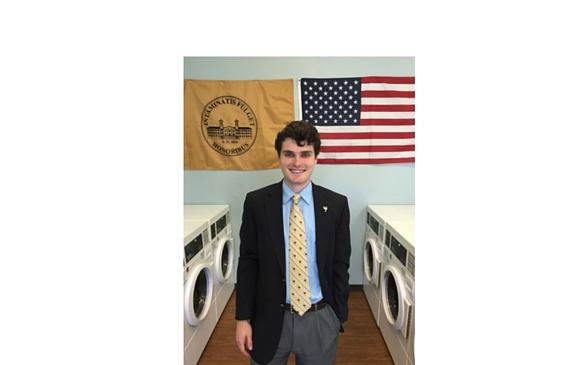By: Anna Aguillard, Senior Writer
At the beginning of his term, Campus Union President Billy Moody, his cabinet and Dean Bigger, campus union advisor, had two primary goals: fixing the “small things” that can improve student experience and increasing student involvement in shaping the future of Wofford.
After serving roughly half of his term, Moody’s goals remain the same – his challenge now is making sure they last beyond his year term, which will end roughly around Spring Break of 2016.
So far, according to Moody, fixing the small things has been the easy part.
“Facility affairs, which oversees campus buildings, parking, food services and the like, have improved dining options on campus. It is also working on the renovation of the bocce ball court in Phase 2… and in discussions to extend Richardson’s hours and add a printer to the Village laundry room.”
Increasing student involvement – what Moody refers to as “macro-level” improvement – is a much more “long-term, difficult” process.
“Its goal is accomplished by degrees, so it is hard to quantify progress, and this progress is felt only later and indirectly by students,” says Moody.
Moody has come to realize that much of increasing student involvement requires extensive communication improvements. Many of the frustrations that make students feel like they are not involved in Wofford’s administration arise not because administration doesn’t care, but because the problems are not communicated to the proper people.
“Many times, either student opinion is unknown or simply misunderstood, and that disconnect in communication is the first place we have looked into making ‘It’s Our Wofford’ a reality,” said Moody.
In an effort to improve communication, Campus Union created an electronic “Campus Improvement” form, detailed in a previous Old Gold and Black article. Additionally, Campus Union has made serious efforts to systematically meet with administration, faculty and staff to start dialogues about student opinion.
“In addition, we are working with the board of trustees to develop systems and events for the trustees to have more conversations with students. Many of the trustees have expressed a sincere interest in hearing directly from students, and we are now working on how to best facilitate those interactions.”
With these improvements made, Moody looks forward to the remainder of his term to develop infrastructure to ensure that the improvements made by current Campus Union officers last beyond the present term.
“We have greatly increased communication between Campus Union and the Wofford administration, faculty and staff; however, we have yet to develop and implement the system for maintaining these lines of communication for the long term.”
Moody hopes to create and execute a “three-pronged communication improvement project” by the end of his term, part of which includes the electronic Campus Improvement form.
Holding back the process of implementing a communication plan, according to Moody, are natural roadblocks that all college students face: time and determination.
“We are all students with dozens of other things going on besides Campus Union, so it is very easy to put things off for later and let things slip through the cracks… If we do nothing, we are moving backwards. We always have to be looking for things to improve, not passively going through the motions,” says Moody.
While balancing academic, social and leadership roles, Moody said he will continue to work toward improving Wofford’s communication system and fix “a million other small things” in order to change campus for the better.
“We will always have a long way to go, but that keeps it fun,” says Moody.






























